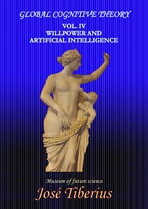4. The human being, feelings, and willpower
4.a) Non-existence
From all the previous discussion about willpower, a logical implication is emerging slowly: if the decisions humans make do not depend on just one being or origin of will, it seems evident that this being does not exist.
The human willpower is the consequence of the individual will of a multitude of more elemental living beings modulated by a system of personal decision.
In this sense, we could say, "I think. Therefore, I am not."
On the other hand, the idea of being human fits in perfectly with the concept of the vital impulse system.
The book of the Conditional Evolution of Life states the vital impulse systems act as living beings, or at least, have many of their main characteristics.
Likewise, it considers superior animals as symbiotic macro-societies of more elemental units with their own life, like cells.
The order of intuitive proximity indicates that the components of the more elemental type of vital impulse systems are also living beings –nation, state, beehive, ecosystems.
All of the above poses the questions, "From where do we come? Where are we going? Who are we?" It is very tough to answer, perhaps impossible. It is like asking, "From where does a state come? Where is a beehive going?"
These questions are not very relevant because we are talking about organizational forms. To be able to respond, first, we should give a precise answer to "What are we?"
From a strictly scientific point of view, we are animals evolved from monkeys, and it looks like our existence is a vital impulse system.
We cannot even guarantee the continuous existence of human beings from a spiritual point of view, given that, as we have seen in discussing the decision-making processes or formation of the will, our different components or individual elements do not agree nor do they have the same points of view or morals.
4.b) The being and existence
This section will not end on a bitter and adverse note. A vital impulse system is not derogatory; on the contrary, it is a way of being able to dominate higher scales than those of the individual.

For instance, a country can obtain objectives for its citizens who cannot accomplish these objectives by themselves.
The spiritual dimension also has positive aspects; sometimes it gives the impression many people behave or feel like one individual as if the action was unanimous –a perfect synchronization of feelings– a colossal bubble of energy.
Human beings work differently in regards to feelings; the majority does not decide on them. They are not decisions they are situations. Instead, it invades us; it takes us over. We could cite many sentences from diverse religions that are especially relevant when speaking about feelings and the spiritual essence of living beings.
One of the most significant hitches of this subject is that approximation requires the use of metaphors and other poetic figures that, on many occasions, end up misinterpreted, above all, over time.
So, we can say, "I feel. Therefore I am."
Regardless, at risk of exceeding our goals, we believe we have a dual nature –we are not the first ones to say so. On the one hand, we do not exist in the traditional sense of the expression, and, on the other, we do in a dimension unknown to our intellect.
We are talking about the temporary discontinuity of our existence!
